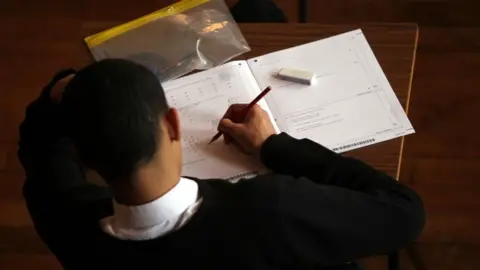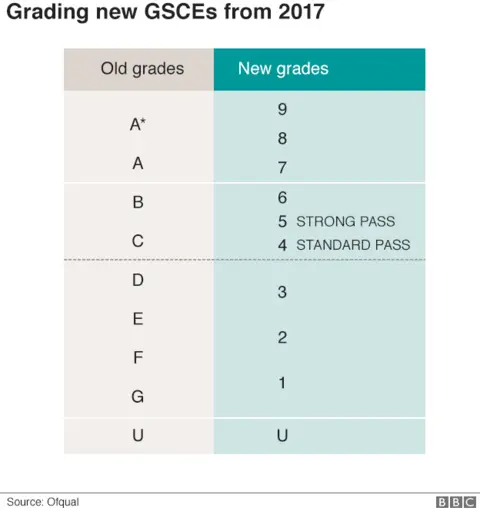GCSE: Pass rate dips as students face tougher exams
 PA
PAGCSE passes have dropped slightly across the range of subjects, with some dramatic changes in new, tougher exams sat for the first time in England.
Overall in England, Wales and Northern Ireland, passes (grades C/4 and above) dropped 0.6 percentage points to 66.3%.
In England, the English literature pass-rate fell 2.2 percentage points to 72.4%. In maths it dropped from 71.4 to 70.7%. Both are new, tougher exams.
Exam boards said this year's results were broadly consistent with last year.
But the exams regulator Ofqual says a pass or grade 4 in maths would have been achieved in the upper tier paper with just 18% of the overall marks.
For a grade 9, a 79% mark was required, while for a grade 7 - the equivalent of an A - candidates needed just over half marks.
There has been a particular focus on this maths GCSE, with many students posting concerns online about the exam after they sat it.
'Careful planning'
Ofqual explained the higher tier paper caters for more able students and starts with with grade 4 or pass mark level questions, adding that the 18% pass mark reflected this.
Exam boards insist that standards have been held steady, despite complaints by some students and teachers about a lack of textbooks and practice papers.
They explained the fall in the pass rate for the English literature GCSE in England by saying this year's cohort had had slightly lower prior attainment.
The proportion of entries receiving the top grades (A/7 or above) has also fallen, to 20%, down 0.5 percentage points on last year. This is the lowest since 2007, when the figure was 19.5%
Half a million pupils are getting their results, amid a switch to a new numerical grading system and tougher exams in England.
In each of the three new O-level-style GCSE subjects - English, English literature and maths - a new top grade 9 has been created.
Some 3.2% of papers were awarded this grade in English literature, 2.2% in English language and 3.5% in maths.
Exam boards revealed that 2,000 extremely able candidates got a 9 in all three new exams. There were 50,000 grade 9s overall - two-thirds of which were girls.
The regulator said the percentage of passes would be kept the same as under the old system, in the interest of fairness, but some experts say the new exams are the toughest since the late 1980s.
Others have complained the new 9 to 1 grading system would be confusing for parents, admissions tutors and employers.
Under this system, an A is equivalent to a 7 while a C is anchored at the bottom of a grade 4.
Top grades
The reason for introducing three bands - 7 to 9 - instead of just A* and A at the top end - was to give more detail about the highest-achieving candidates.
This year's GCSE candidates in England, about 90% overall, are the first to sit the exams after the changes pushed by former Education Secretary Michael Gove.
Schools Minister Nick Gibb said pupils and teachers were already rising to the challenge.
He highlighted that more than 50,000 top 9 grades had been awarded across the new GCSEs and more than two-thirds of entries had secured at least a standard pass.
This year also marks a divergence in qualifications between the nations, with candidates in England, Wales and Northern Ireland now all studying different exams.
In Wales, exams in English, Welsh and maths (six GCSEs in total) have also been toughened, but the qualification is still taken in units. New GCSEs in other subjects are being phased in.
Here GCSE results for A* to C grades fell sharply by 3.8 percentage points to 62.8% compared to 66.6% in 2016.
Exams watchdog Qualifications Wales says changing entry patterns have contributed to the fall.
In Northern Ireland, where pupils are generally sitting old-style GCSEs in all subjects this year, results have improved here again, with one in 10 entries being awarded an A*.
Pupils in Scotland already sit a completely different set of exams.
Sally Collier, chief regulator at England's exams watchdog, said the results reflected "years of careful planning".
'More challenging'
She said the new qualifications had allowed students "to better demonstrate their abilities" and had "better prepared them for further study, if that is their choice".
 PA
PAShe added that the regulator had required exam boards to use the same system on comparable outcomes to ensure fairness: "If a student receives a grade 7 today, they could have expected to have received a grade A last year.
"And if they get a grade 4, they could have expected to get a grade C in 2016."
But Alan Smithers, an exams expert at Buckingham University, said in order to create equivalence between new grades and old, the number of marks required for a pass had been dropped at various levels.
"In some cases, it's dropped them very low, it's more or less giving away the grade."
'Severe pressure'
Secondary school heads have expressed concern about increased stress and anxiety among pupils taking these exams and that is expected to intensify next year.
Association of School and College Leaders general secretary Geoff Barton said he was concerned to see a decline in the pass rate overall and feared that this may be the result of driving children down this narrow academic route.
The more challenging GCSEs were putting severe pressure on young people, he added.
His organisation will be carrying out a "post-mortem" on the results and exams experience with Ofqual.

It also pledged to talk to the Department for Education about how the impact of these much tougher exams on young people can be mitigated.
